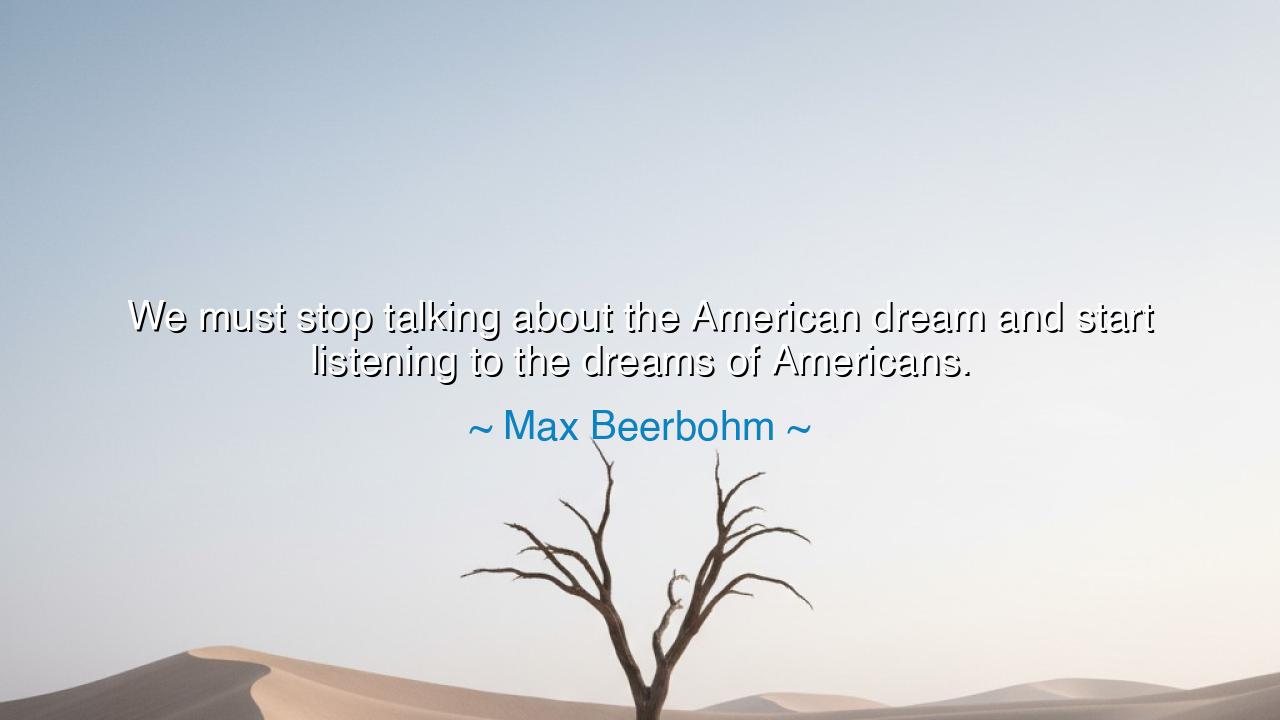
We must stop talking about the American dream and start listening
We must stop talking about the American dream and start listening to the dreams of Americans.






“We must stop talking about the American dream and start listening to the dreams of Americans.” — Max Beerbohm
In these words of quiet thunder, Max Beerbohm delivers a truth that pierces through the fog of nations and reaches the heart of humanity. His voice is not merely that of a critic, but of a seer, urging us to awaken from complacency and to hear — truly hear — the voices of those who live beneath the grand symbols of hope. The American Dream, that shining idea of prosperity and freedom, has been spoken of for generations — yet Beerbohm reminds us that dreams do not live in speeches or slogans, but in the hearts of the people themselves. To speak endlessly of a dream is to make it myth; to listen to the dreams of others is to make it real.
The origin of this quote rests in Beerbohm’s gift for wit and observation. Though he lived in an earlier century, his reflection transcends its time. As a satirist, he understood the danger of grand ideals that become disconnected from the lives they were meant to serve. In his words, we hear not cynicism, but wisdom: that a nation’s greatness is not defined by what it claims to be, but by how it listens to its people — their hopes, their fears, their struggles, their silent longings. To “stop talking about the American dream” is to cease repeating hollow phrases; to “start listening to the dreams of Americans” is to remember that every citizen, no matter how small, carries within them the seed of the nation’s renewal.
Throughout history, every empire, every republic, has faced this same test. When the rulers and the privileged speak only of ideals, while forgetting the people whose lives give those ideals meaning, the bond between dream and reality breaks. Consider the story of Franklin D. Roosevelt, who, in the dark years of the Great Depression, chose not to preach about prosperity but to listen to the cries of the hungry, the jobless, the forgotten. He traveled among them, heard their stories, and from those stories he built the New Deal, a dream reshaped by the dreams of the people. That was no abstract “American dream” — it was the collective heartbeat of a wounded nation made visible through action.
Beerbohm’s words remind us that dreams are not monuments to be worshiped, but gardens to be tended. The American dream — and indeed every national ideal — must evolve, or it will die of pride. For what is the worth of a dream that cannot feed the hungry or house the poor? What meaning has liberty if it does not reach the oppressed, or success if it blinds us to the suffering of others? The true measure of a nation lies not in the grandeur of its myth, but in its willingness to listen, to change, to humble itself before the voice of its people.
This truth extends beyond nations and into the soul of every person. How often do we speak of our ideals — of happiness, of love, of success — without stopping to listen to the dreams of those around us? We proclaim what life should be, yet ignore the silent aspirations of our friends, our neighbors, even our own hearts. Beerbohm’s wisdom calls us back to empathy — to the art of listening, which is rarer and nobler than the art of speech. For to listen is to give life; it is to make space for another’s soul to unfold.
If we, as individuals and as societies, wish to fulfill any dream — American or otherwise — we must first cultivate humility. We must learn to ask: What do people need? What do they long for? What do they fear? Every great movement of history began when someone listened — when Abraham Lincoln heard the cry for freedom, when Martin Luther King Jr. heard the anguish of the oppressed and transformed it into the music of justice. They did not invent the dream; they heard it in others, and helped it take form.
So let this be your lesson, children of tomorrow: speak less of the dream, and listen more to the dreamers. Let your ears be open to the murmurs of the weary, the voices of the forgotten, the songs of the young and the old. For the greatness of a nation, and the greatness of a soul, lies not in what it says about itself, but in how it listens — deeply, compassionately, courageously. When we listen, the dream breathes again; when we care, it begins to live.
And thus, the words of Max Beerbohm stand not as a reproach, but as a call to renewal. The “American dream” is not a finished tale but an unfinished symphony, written anew each day in the hearts of the people. Stop reciting its chorus — go among them, and hear its verses. For only when we listen to the dreams of others do we begin to hear the true dream of humanity — a dream not of wealth or fame, but of dignity, compassion, and the simple grace of being heard.






AAdministratorAdministrator
Welcome, honored guests. Please leave a comment, we will respond soon